SCIENCE AND STUDIES
Hypnosis Research
BLOOD PRESSURE
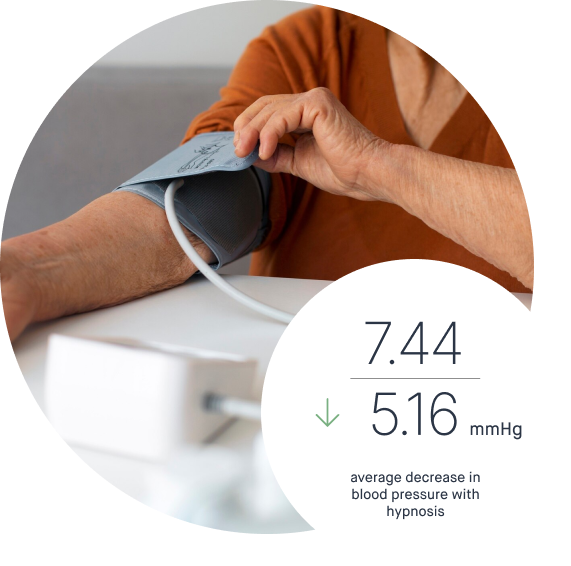
Hypnosis improves blood pressure in people with hypertension (Upoyo et al., 2022).
BLOOD PRESSURE
CANCER
Hypnosis with conscious sedation satisfied 90% of women with breast cancer receiving port implantation (Sterkers et al., 2018).
Self-hypnosis combined with self-care is effective in improving well-being in women with breast cancer (Grégoire et al., 2018).
CANCER
COGNITIVE PERFORMANCE

Hypnosis improves task performance in surgical training (Sroka et al., 2015).

Hypnosis improves reaction time in attentive tasks for people with and without ADHD (Vitra et al., 2015).

COGNITIVE PERFORMANCE
GUT & URINARY CONDITIONS
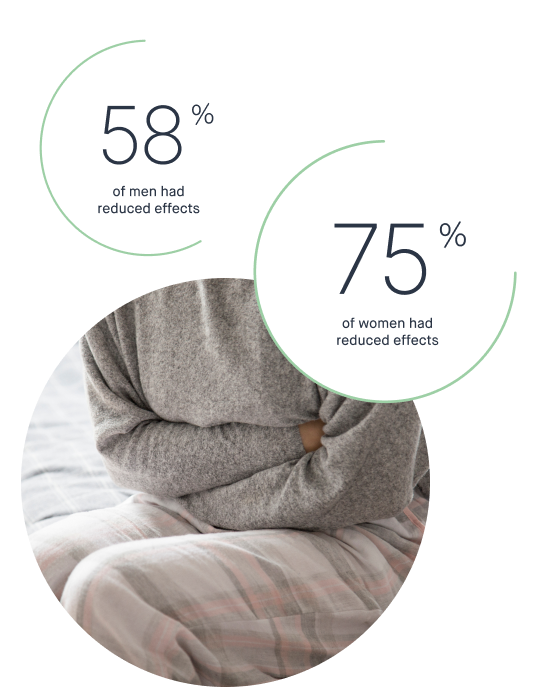
Online gut-directed hypnotherapy reduces IBS symptoms and is recommended by 90% of participants (Noble et al., 2022).
GUT & URINARY CNDITIONS
MENTAL HEALTH
Hypnosis reduces stress and provides high treatment satisfaction (Fisch et al., 2020).
Hypnosis improves symptoms of anxiety
(Valentine et al., 2019).
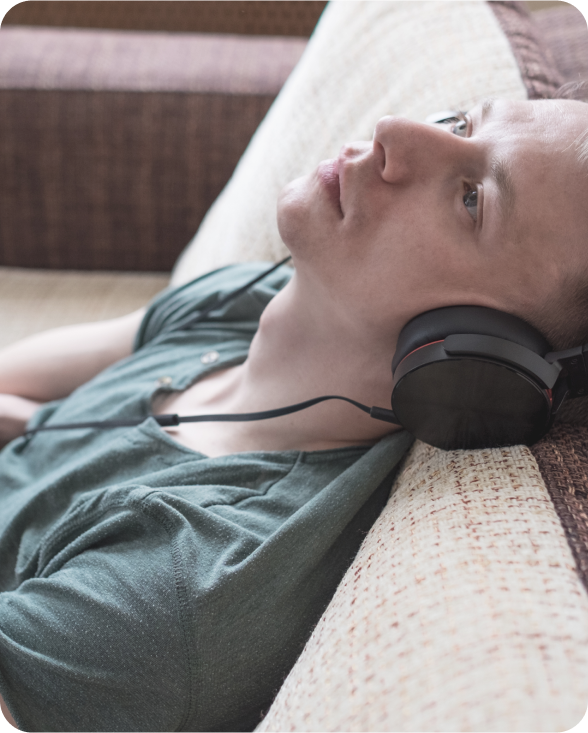
Hypnosis improves heart rate variability in people with depression (Chen et al., 2017).
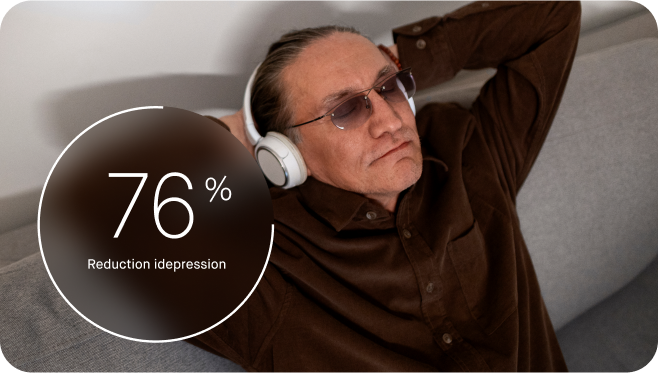
Hypnosis improves symptoms of depression (Milling et al., 2019).


Hypnosis improves self-
esteem in children with chronic conditions (Hazard et al., 2024).
MENTAL HEALTH
PAIN
Online hypnosis audio recordings can reduce headache symptoms in people experiencing migraines (Flynn, 2019).
On average, people receiving hypnosis had more reduced pain than 73% of people using control methods (Milling et al., 2021).
Hypnosis can help manage musculoskeletal and neuropathic chronic pain (Langlois et al., 2022).
Hypnosis is a feasible complementary pain management strategy for hemophilia (Paredes et al., 2021).
Guided imagery and hypnosis show efficacy in reducing symptoms of fibromyalgia (Zech et al., 2017).
Hypnosis can reduce pain in hospitalized seniors (Ardigo et al., 2016).
Hypnotherapy reduces pain quality and anxiety in men with burns (Jafarizadeh et al., 2018).
PAIN
REPRODUCTIVE HEALTH

Teaching pregnant women self-hypnosis provides a positive impact on their childbirth experience (Werner et al., 2013).
REPRODUCTIVE HEALTH
Werner, A., Uldbjerg, N., Zachariae, R., Wu, C. S., & Nohr, E. A. (2013). Antenatal hypnosis training and childbirth experience: a randomized controlled trial. Birth (Berkeley, Calif.), 40(4), 272–280. https://doi.org/10.1111/birt.12071
Shah, M., Monga, A., Patel, S., Shah, M., & Bakshi, H. (2014). The effect of hypnosis on dysmenorrhea. The International journal of clinical and experimental hypnosis, 62(2), 164-178.https://doi.org/10.1080/00207144.2014.869128
Hot flashes are a frequent symptom in breast cancer survivors, as up to 90% of young breast cancer survivors experience premature menopause due to their treatment. Because estrogen replacement therapy, an effective treatment for hot flashes, is not recommended for women who have previously had breast cancer or have a risk for breast cancer, they must seek alternative treatment for hot flashes. This randomized controlled trial involved 15 women with a personal history of breast cancer or an increased risk of breast cancer who reported having at least one hot flash a day. The women were split into groups receiving either three weekly hypnotherapy sessions or gabapentin, an anticonvulsant drug. After eight weeks, the median number of daily hot flashes was reduced by 33.3% in the gabapentin group and by 80% in the hypnotherapy group. The median hot flash severity was reduced by 33.3% in the gabapentin group and 85% in the hypnotherapy group. There were no statistically significant differences between the groups. These results indicate the efficacy of hypnotherapy in improving hot flashes and validate hypnotherapy as a safe and effective alternative to drug treatment.
SLEEP
Self-hypnosis in-person and by phone improves sleep quality in postmenopausal women (Elkins et al., 2021).
Poor sleep is one of the most frequent health concerns among menopausal women, and training in self-hypnosis could help alleviate symptoms. This randomized trial studied 90 postmenopausal women who were split into 4 groups, each of which received either 3 in-person self-hypnosis sessions, 5 in-person self-hypnosis sessions, 3 self-hypnosis phone calls, or 5 self-hypnosis phone calls, all over 5 weeks. Pittsburgh Sleep Quality Index (PSQI) score was used to measure sleep quality. By the end of treatment, all groups had an improvement in sleep quality compared to before treatment (p < 0.05), with no significant difference between groups.
SLEEP
Poor sleep is one of the most frequent health concerns among menopausal women, and training in self-hypnosis could help alleviate symptoms. This randomized trial studied 90 postmenopausal women who were split into 4 groups, each of which received either 3 in-person self-hypnosis sessions, 5 in-person self-hypnosis sessions, 3 self-hypnosis phone calls, or 5 self-hypnosis phone calls, all over 5 weeks. Pittsburgh Sleep Quality Index (PSQI) score was used to measure sleep quality. By the end of treatment, all groups had an improvement in sleep quality compared to before treatment (p < 0.05), with no significant difference between groups. A range of 81.3% to 100% of participants across groups had a clinically meaningful improvement in PSQI. With comparable successful results across in-person delivery and phone delivery, the study suggests that audio recordings to practice self-hypnosis at home could be an accessible and effective method to improve sleep.
Elkins, G., Otte, J., Carpenter, J. S., Roberts, L., Jackson, L. S., Kekecs, Z., Patterson, V., & Keith, T. Z. (2021). Hypnosis Intervention for Sleep Disturbance: Determination of Optimal Dose and Method of Delivery for Postmenopausal Women. The International journal of clinical and experimental hypnosis, 69(3), 323–345. https://doi.org/10.1080/00207144.2021.1919520
Alldredge, C. T., Snyder, M., Stork, S. R., & Elkins, G. R. (2024). Exploring Variables Associated with the Effects of a Self-Administered Hypnosis Intervention for Improving Sleep Quality. The International journal of clinical and experimental hypnosis, 72(2), 94–108. https://doi.org/10.1080/00207144.2023.2278720
Prostate cancer is the most common type of cancer in men in the United States. Treatment provides a high survival rate but can also cause prolonged side effects, including insomnia. The study surveyed 82 men with prostate cancer on their insomnia symptoms and willingness to try behavioral strategies to improve sleep. Among different treatment options of medication, cognitive-behavior therapy (CBT), hypnosis, mindfulness, acupuncture, and herbal supplements, hypnosis was the method that the fewest number of participants had tried. Among men who had not tried hypnosis, a majority of those who had moderate to severe insomnia, were willing to try hypnosis. This was a significantly higher interest compared to those who had milder insomnia symptoms (p < 0.001). A similar trend was observed with CBT (p < 0.01). The results show that men more severely affected by insomnia are most interested in non-pharmaceutical treatments like CBT and hypnosis, when given a choice of novel therapeutic interventions.
Delpachitra, S., Campbell, A., & Wibowo, E. (2020). Preference for sleep management strategies among prostate cancer patients: An Aotearoa/New Zealand perspective. Cancer treatment and research communications, 25, 100219. https://doi.org/10.1016/j.ctarc.2020.100219
SMOKING CESSATION

Hypnotherapy is more effective than nicotine replacement therapy for smoking cessation (Hasan et al., 2014).
Nearly four million smokers are hospitalized each year, which can help motivate them to stop smoking. This randomized controlled trial studied 122 smokers who were hospitalized for heart or lung illnesses. They were split among three groups that received either a single hypnotherapy session, 30 days of nicotine replacement therapy (NRT), or combined hypnotherapy and nicotine replacement therapy (HNRT).

SMOKING
Nearly four million smokers are hospitalized each year, which can help motivate them to stop smoking. This randomized controlled trial studied 122 smokers who were hospitalized for heart or lung illnesses. They were split among three groups that received either a single hypnotherapy session, 30 days of nicotine replacement therapy (NRT), or combined hypnotherapy and nicotine replacement therapy (HNRT). Additionally, everyone received self-help materials and counseling. Using multivariable regression analysis, members of the hypnotherapy (p = 0.03) and HNRT groups (p = 0.04) were over three times more likely than the NRT group to abstain from smoking 26 weeks after discharge from the hospital. This demonstrates the efficacy of hypnotherapy combined with counseling over conventional NRT combined with counseling in aiding smoking cessation among a motivated group.
Hasan, F. M., Zagarins, S. E., Pischke, K. M., Saiyed, S., Bettencourt, A. M., Beal, L., Macys, D., Aurora, S., & McCleary, N. (2014). Hypnotherapy is more effective than nicotine replacement therapy for smoking cessation: results of a randomized controlled trial. Complementary therapies in medicine, 22(1), 1–8. https://doi.org/10.1016/j.ctim.2013.12.012
Worldwide, more than eight million people die each year as a result of tobacco use. CBT is an established method for smoking cessation. Smokers who want to quit showed interest in hypnotherapy for smoking cessation when surveyed. This randomized controlled trial aimed to compare the efficacy of hypnotherapy versus CBT for smoking cessation. A total of 360 smokers who were willing to quit were split into groups receiving either hypnotherapy or CBT once a week for six weeks. The groups were followed for one year. During this time, 15% of the hypnotherapy group continuously abstained from smoking while 15.6% of the CBT group achieved the same result. This difference was not statistically significant (p>0.05), which suggests a comparable efficacy between hypnotherapy and CBT for smoking cessation.
Batra, A., Eck, S., Riegel, B., Friedrich, S., Fuhr, K., Torchalla, I., & Tönnies, S. (2024). Hypnotherapy compared to cognitive-behavioral therapy for smoking cessation in a randomized controlled trial. Frontiers in psychology, 15, 1330362. https://doi.org/10.3389/fpsyg.2024.1330362
Paige, S. R., Alber, J. M., Stellefson, M. L., & Krieger, J. L. (2018). Missing the mark for patient engagement: mHealth literacy strategies and behavior change processes in smoking cessation apps. Patient education and counseling, 101(5), 951–955. https://doi.org/10.1016/j.pec.2017.11.006
SPORTS & MUSIC PERFORMANCE
SPORTS & MUSIC PERFORMANCE
Hypnotherapy decreases musical performance anxiety (Brooker, 2018).
Over 60% of performing musicians are expected to experience musical performance anxiety in their lifetime, which can have a negative effect on behavior and performance. This randomized controlled trial involved 46 advanced pianists with musical performance anxiety who were split into three groups receiving either cognitive hypnotherapy, eye movement desensitization and reprocessing (EMDR), or a control group with no therapy.
Hypnosis improves self-efficacy and performance of soccer players (Barker et al., 2010).
SPORTS & MUSIC PERFORMANCE
Over 60% of performing musicians are expected to experience musical performance anxiety in their lifetime, which can have a negative effect on behavior and performance. This randomized controlled trial involved 46 advanced pianists with musical performance anxiety who were split into three groups receiving either cognitive hypnotherapy, eye movement desensitization and reprocessing (EMDR), or a control group with no therapy. The participants were studied over a period in which they performed at two concerts, one before and one after treatment. Results showed that both the hypnotherapy and EMDR groups (but not the control) experienced a significant reduction in state anxiety after therapy and a significant improvement in performance. This suggests both hypnotherapy and EMDR are effective methods in decreasing musical performance anxiety and improving performance.
Brooker, E. (2018). Music performance anxiety: A clinical outcome study into the effects of cognitive hypnotherapy and eye movement desensitization and reprocessing in advanced pianists. Psychology of Music, 46(1), 107-124. https://doi.org/10.1177/0305735617703473
Self-efficacy means the belief in one’s abilities, which has a proven psychological impact in sports. This study evaluated the effects of hypnosis on self-efficacy and soccer performance. In this randomized controlled trial, 59 college soccer players were split into groups that received either three sessions of hypnosis with ego-strengthening suggestions or a control group that watched professional soccer games. Then, performance was assessed using a soccer wall-volley task involving kicking a soccer ball at a target. Self-efficacy was analyzed using a questionnaire. Participants were measured after treatment and at a four-week follow-up. The hypnosis group held higher self-efficacy beliefs than the control group after treatment (p < 0.001) and also remained higher at the follow-up stage (p < 0.001). In terms of performance, after treatment, the hypnosis group scored higher on the soccer wall-volley task than the control group (p < 0.001) and performed better again at the four-week follow-up (p < 0.006). The results show that hypnosis has a medium to large effect on self-efficacy and performance, suggesting that hypnosis could be leveraged by sports psychologists and athletes.
Barker, J., Jones, M., & Greenlees, I. (2010). Assessing the immediate and maintained effects of hypnosis on self-efficacy and soccer wall-volley performance. Journal of sport & exercise psychology, 32(2), 243–252. https://doi.org/10.1123/jsep.32.2.243
WEIGHT LOSS
Hypnosis and hypnosis combined with CBT can increase weight loss (Milling et al., 2018).
Hypnosis reduces food impulsivity in patients with obesity and high levels of disinhibition (Delestre et al., 2022).
WEIGHT LOSS
Milling, L. S., Gover, M. C., & Moriarty, C. L. (2018). The effectiveness of hypnosis as an intervention for obesity: A meta-analytic review. Psychology of Consciousness: Theory, Research, and Practice, 5(1), 29–45. https://doi.org/10.1037/cns0000139
Delestre, F., Lehéricey, G., Estellat, C., Diallo, M. H., Hansel, B., & Giral, P. (2022). Hypnosis reduces food impulsivity in patients with obesity and high levels of disinhibition: HYPNODIET randomized controlled clinical trial. The American journal of clinical nutrition, 115(6), 1637–1645. https://doi.org/10.1093/ajcn/nqac046
Erşan, S., & Erşan, E. E. (2020). Effects of Hypnotherapy on Weight Loss and thus on Serum Leptin, Adiponectin, and Irisin Levels in Obese Patients. Journal of alternative and complementary medicine (New York, N.Y.), 26(11), 1047–1054. https://doi.org/10.1089/acm.2020.0104
Consistent self-hypnosis promotes weight loss for people with severe obesity (Bo et al., 2018).
Meet our Science Board

DR. Ryan Casarella
MD
After residency, Ryan moved to Las Vegas and worked as a nocturnist in the Valley Health System for three years. He now practices at Westchester Medical Center in Valhalla. Outside of work, Ryan is an avid sports fan who enjoys home renovation, mixology, and outdoor activities.

Tricia Conlon
M.A, LPCC-S, LCDCIII
Tricia has spent the majority of her career working with adolescents, couples and entire families coping with mental illness, anticipatory grief, divorce, and trauma. Currently, she specializes in working with individuals who have depression, anxiety, cognitive impairment, trauma, and bereavement issues. Tricia is also a Certified Alzheimer’s Level I and II Trainer through the University of South Florida. Tricia is also trained in CBT, mindfulness meditation practices, and EMDR.


Ashlie Cox
M.A, LPCC-S, LCDCIII
As a clinical therapist at Holistic Therapy and Healing in Cincinnati, Ashlie leads intensive therapeutic experiences, facilitates groups, develops therapeutic curricula, and provides clinical supervision. She values hypnotherapy for its ability to create a safe space and reveal deeper issues that other modalities may not address as quickly.

Rose Fortese
RN BSN
She is studying to be a Women’s Health Nurse Practitioner and plans to further her career providing obstetrics and gynecology care. In her spare time, she enjoys yoga, running and spending time with her husband and four children.

Dr. Nandini Gupta
MD FRCPC
Despite a demanding career that initially limited her time for artistic endeavors, Dr. Gupta’s passion for the arts remained a core part of her identity. Her passion was reignited during frequent visits to New York where she was continually inspired by its vibrant art scene. This led her to Columbia University, where she completed a Certificate of Professional Achievement in Narrative Medicine—a field that blends the humanities, arts, and clinical practice.


Dr. Natasha Kathuria
MD MPH
She is studying to be a Women’s Health Nurse Practitioner and plans to further her career providing obstetrics and gynecology care. In her spare time, she enjoys yoga, running and spending time with her husband and four children.

Dr. Connie Kerali
MB ChB, BSc (Hons), MSc
She has worked in the UK’s National Health Service in specialties including Emergency Medicine (St Thomas’ Hospital, London), Pediatrics, Obstetrics & Women’s Health, Psychiatry, and Urology. She specializes as a General Practitioner in both a public and private setting. Dr. Kerali has also worked in Luxembourg for a European Institution in an Occupational Health setting.


Angela King
AP, DOM
Angela King, AP, DOM, is an Acupuncture Physician and Clinic Director of Indian River Acupuncture & Functional Medicine in Vero Beach, FL. Since 2007, she has built the largest multi-disciplinary acupuncture practice in the community. In 2023, her clinic partnered with the Scully-Welsh Cancer Center to provide acupuncture for oncology patients. Angela specializes in blending Eastern Medicine with Functional Medicine to address chronic health issues. She is extensively trained in areas like the gut microbiome, inflammation, and autoimmune conditions.
A Certified Level 3 practitioner in Neuro-Emotional Technique (NET), her skills have led to a waitlist practice. Angela also offers Esoteric Acupuncture to align consciousness using sacred geometry. Angela graduated Phi Beta Kappa and Summa Cum Laude from Agnes Scott College and earned her Master’s in Oriental Medicine, also Summa Cum Laude, from the Florida College of Integrative Medicine. Outside of work, she enjoys yoga, live music, and exploring nature.

Emily McKenna
LCPC, CHt.
Emily has a Master of Arts degree in Counseling from Lewis University. She is trained in DBT, Certified in Trauma informed hypnotherapy (TIH) and trained in hypnosis.


Dr. Pinar Ozmizrak
PH.D
Her PhD dissertation was about developing interdisciplinary online genetics education. Pinar has a keen interest in advocating for genetics education, particularly for rare genetic diseases and public health education. She is dedicated to supporting scientific literacy and open-access research. Pinar is also a certified yoga instructor and is passionate about animal rescue.

Megan Palermo
BSN, RNC-OB
Megan Palermo is a dedicated Registered Nurse with 13 years of diverse care experience, specializing in labor and delivery, postpartum, and newborn care. Currently, she serves as a Clinical Nurse Educator at a community hospital while also working as a labor nurse at a larger tertiary care center. A certified childbirth educator and passionate patient advocate, she strives to empower families during one of life’s most transformative moments.
As a wife and mother of two wonderful children, Megan balances her professional commitments with family life. She is currently pursuing a master’s in public health, set to graduate in spring 2025. In her free time, she enjoys running, hiking, yoga, photography, gardening, traveling, and exploring new culinary experiences.


Cindy Smalletz
M.S., OTR/L, BCB
Her goal is to transform healthcare globally by enhancing advocacy, communication, and action. Recently, she has supervised OT students in behavioral health settings and introduced narrative medicine into new areas of care.
INFORMATION WE TRUST
Our Medical
Education Partner

Your content goes here. Edit or remove this text inline or in the module Content settings. You can also style every aspect of this content in the module Design settings and even apply custom CSS to this text in the module Advanced settings.
GRACE’S HYPNOTHERAPY FEATURED ON MEDCIRCLE
GRACE HYPNOTHERAPY
Get Started Today

Grace App
Access over 100 recordings and practice hypnotherapy anywhere, any time, for free.
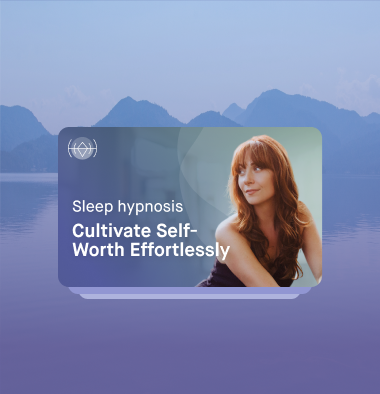
Explore our Videos
Watch 160+ hypnotherapy videos on the Definitive Channel on Rewiring Your Subconscious.

Private 1:1 Sessions
Schedule a custom session with a certified hypnotherapist

